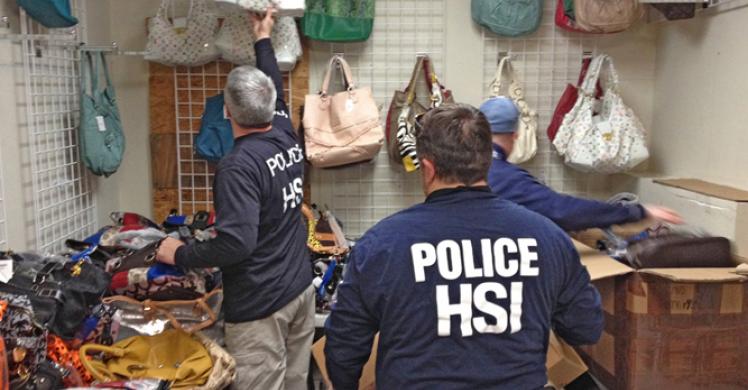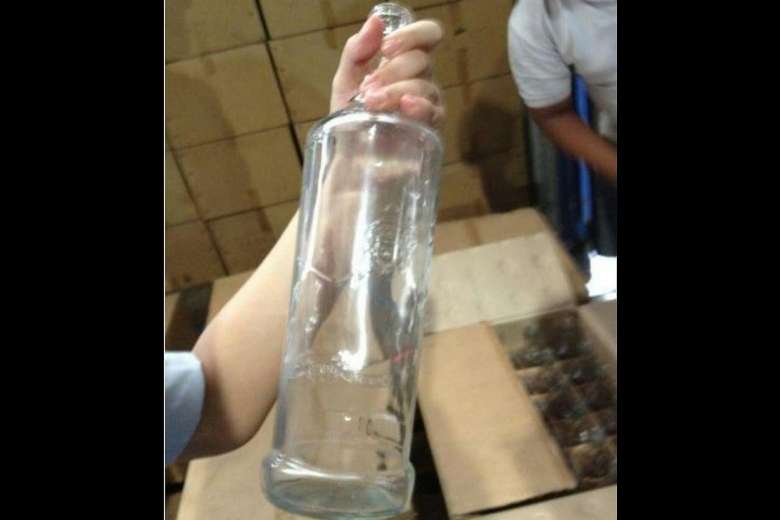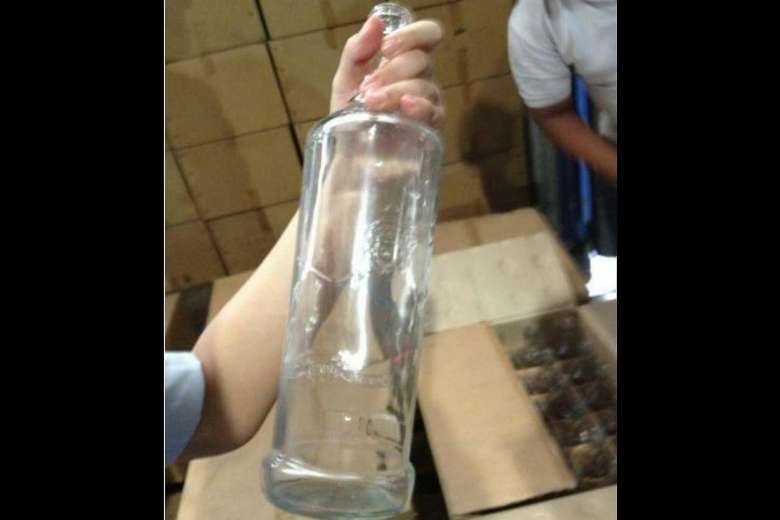
HSI seizes nearly $2 million in counterfeit goods from Nashville
NASHVILLE, Tenn. – U.S. Immigration and Customs Enforcement’s (ICE) Homeland Security Investigations (HSI) in coordination with the Metropolitan Nashville Police Department seized thousands of counterfeit items worth a total manufacturer’s suggested retail price of more than $1.8 million from Legends Clothing Store on Bell Road Tuesday. The seized items include counterfeit designer clothing and handbags bearing the trademarks of Chanel, Gucci, Louis Vuitton, Michael Kors, Nike and Ralph Lauren. Investigators also seized counterfeit National Football League, National Basketball Association and Major League Baseball sportswear. “Criminals who sell counterfeit products are economic parasites who harm legitimate businesses that pay taxes, create jobs and support our national economy,” said Special Agent in Charge of HSI New Orleans Raymond R. Parmer Jr. “Anyone who thinks counterfeiting is a victimless crime should realize the profits of these black-market sales are routinely diverted to support further criminal activity such as drug trafficking, money laundering and even potential terrorism.” Parmer oversees a five-state area of responsibility including Tennessee, Alabama, Arkansas, Louisiana and Mississippi.
http://www.ice.gov/news/releases/1401/140109nashville.htm
Lear More
Crackdown on counterfeiting
From fake versions of the drugs Viagra and Xanax to phony designer watches and handbags, counterfeiting is rising fast and is increasingly becoming a booming underground economy. And while counterfeiters reap significant profits, millions of consumers are at risk from unsafe and ineffective products. Who hasn’t been tempted to purchase a fake designer handbag or watchâ��? They are a fraction of the cost of authentic designer products, ranging from the hundreds to the ten-thousands depending on the designer, the style and the materials used. But there are many reasons not to buy knock-offs, first and foremost because fakes harm people and hurt the economy. Despite being against the law, counterfeiting is big business. Counterfeit products exist in virtually every area – food, drinks, clothes, shoes, pharmaceuticals, electronics, auto parts, toys, currency, tickets for transport systems and concerts, alcohol, cigarettes, toiletries, building materials and much, much more.
http://www.iso.org/iso/home/news_index/news_archive/news.htm?refid=Ref1809
Lear MoreGibraltar vows to strengthen fight against cigarette smuggling
Gibraltar vowed Tuesday to step up its fight against cigarette smuggling from the British outpost into Spain, a major source of tension with Madrid. Cigarettes are around 40 percent cheaper in Gibraltar than in Spain due to lower taxes and Madrid blames the British territory for a surge in cigarette smuggling to the Spanish mainland. Spain in August introduced stringent border checks at its border with Gibraltar, leading to lengthy queues for motorists, in what it said was a move aimed at clamping down on cigarette smuggling. But Gibraltar argues the stepped up border controls are in retaliation for the installation of an artificial reef in its waters that has prevented Spanish boats from fishing there. In a New Year message broadcast on Gibraltar public television, Chief Minister Fabian Picardo said the British outpost “would not tolerate unsightly illicit tobacco activity on our beaches or near the frontier”.
Lear More
FBI gives pointers on spotting fake cosmetics
Counterfeit cosmetics are increasingly being found in the US and in some cases are “downright dangerous”, according to the FBI. The agency says both the National Intellectual Property Rights (IPR) Centre and cosmetics companies are reporting an uptick in counterfeit cosmetics and fragrances circulating in the marketplace – often distributed via the Internet – because the people behind the activity view it as a low-risk crime. Some of the fake personal care and cosmetics products tested by the FBI have been found to contain toxic materials such as carcinogenic elements (arsenic, beryllium, and cadmium), high levels of aluminium and bacteria. They have been linked to the development of acne, psoriasis, rashes and eye infections.
Lear More
77,850 empty counterfeit vodka bottles handed over to brand owner for destruction
Singapore Customs has handed over 77,850 empty counterfeit vodka bottles, 18 boxes of bottle caps and 10 boxes of labels to its authentic brand owner, Diageo North America, for destruction, following a court order, said a statement on Tuesday. The counterfeit items, all bearing the Smirnoff brand, were seized by Singapore Customs officers on June 6 last year at cargo distribution complex Keppel Distripark. The bottles had been stored in 2,595 cartons.
Lear MorePharmaceutical Anti-counterfeiting Technologies: Market Analysis 2014-2024
Pharmaceutical Anti-counterfeiting Technologies: Market Analysis 2014-2024 – your guide to developments, opportunities and revenues
Where is the pharmaceutical anti-counterfeiting industry heading? Visiongain’s brand new report lets you assess forecasted sales at overall world market, submarket, and national level to 2024.
Our 169 page study investigates technologies to tackle drug counterfeiters. Discover the most lucrative areas in that industry and market, seeing future outlooks.
Forecasts from 2014-2024 and other analyses show you commercial prospects
The BSF nabbed three Bangladeshi smugglers
Shillong, Jan 06: The BSF troops of BOP Bagli, deployed in South West Khasi Hills district of Meghalaya apprehended one Bangladeshi national identified as Karim Sheikh aged 12 yrs, s/o Md Mazid r/o Vill- Bagli, Ps- Tahirpur, Distt- Sunamganj (Bangladesh) while he was trying to cross the International Border from Bangladesh near BP No 1193/6-T. During search, party recovered Indian currency Rs. 6,200/-, Grameenphone recharge coupon-200 Nos @ 50/- per coupon from his possession. In another incident on 03rd Jan 2014, troops of BOP Lailong deployed at East Jaintia Hills distt of Meghalaya also apprehended one Bangladeshi national identified as Doynal Abdin aged 21 yrs, s/o Abdul Malik, r/o Vill- Sonarton Basti, Ps- Kanaighat, Distt- Sylhet (Bangladesh) while he was trying to cross the International Border from India near BP No 1315/2-S. During search, party recovered 24000 Nos Betel nut and 01 Mobile Phone with 01 BD SIM from his possession. During last week, BSF troops on Meghalaya border apprehended 03 Bangladeshi nationals and 02 Indian national and seized 204 Btls Liquor, 05 Nos Cattle heads, Forest produce and other contraband items worth over Rs. 2 Lacs while being smuggled out from India to Bangladesh
http://spnewsagency.com/the-bsf-nabbed-three-bangladeshi-smugglers/
Lear MoreIllegal tobacco dealers held
MUSCAT: The Preliminary Court, on the appeal of the Public Prosecution at Jaalan Bani Bu Ali, sentenced a man to two months in jail and deportation from the country, besides slapping a fine of OMR100, for selling cigarettes that did not match with the specified standards. The seized goods were also ordered to be confiscated. The accused was arrested by the Directorate of the Consumer Protection in South Sharqiyah governorate during an inspection drive which the directorate carried out to find if some cigarettes that did not comply with the standards and non-smoking tobacco norms were being sold in violation of the Consumer Protection Act. In another case, the court slapped a fine of OMR1,000 against a Bangladeshi national and ordered his deportation for selling non-smoking tobacco and also ordered confiscation of the goods. Similarly, the court also issued three judgments against three other Bangladeshis accused of violating the Consumer Protection Act and related orders regarding sale of Afzal and Paan Bahar non-smoking tobacco, Maher Light and Maher Gold cigarettes. These goods were seized from South Sharqiyah and the accused were fined OMR600.
Lear MoreStudy: 40% of cigarettes consumed in West Bank sold ‘illegally’
RAMALLAH (Ma’an) — A large percentage of cigarettes consumed in the Palestinian market are made from local tobacco and sold through informal means, a local study has showed. The study, by Alpha International for Research, Polling and Informatics, suggests that about 45 million cigarette packs are sold illegally in the West Bank every year, which means the Ministry of Finance is losing 400-450 million shekels a year in customs taxes. In addition to not passing through customs, this means that the majority of cigarettes are not subject to tests by the ministry of health nor to the placement of warning messages on packages. The study found that 84 percent of consumers who use illegal cigarettes smoke local tobacco. They either buy tobacco and roll it themselves, or buy homemade cigarettes packaged in nylon sacks or simple boxes. These cigarettes, according to the study, are either smuggled, or packaged manually from tobacco produced by Palestinian farmers mostly from the northern West Bank.
http://www.maannews.net/eng/
Two Pakistani smugglers shot dead in Punjab: BSF
Amritsar, January 04: BSF personnel shot dead two Pakistani smugglers along the India-Pakistan border in Punjab after the duo fired on the troopers when challenged, a spokesman of the paramilitary force said Saturday. The gunfight took place late Friday night near the border outpost Gulgarh in Amritsar sector, 30 km from here. Border Security Forces troopers recovered the bodies of the smugglers Saturday after fog cleared in the area. Four kg of suspected heroin, one pistol and ammunition was also found at the spot. BSF officials said that troops were on high alert following inputs of smuggling from the area. A BSF spokesman said that BSF troopers at Gulgarh observed some suspicious movement of the Pakistanis near the border fence and ordered them to stop. “But they (the Pakistanis) did not pay any heed and opened fire at the BSF troopers,” he said, adding the BSF men returned the fire, killing the two smugglers.
Lear More



